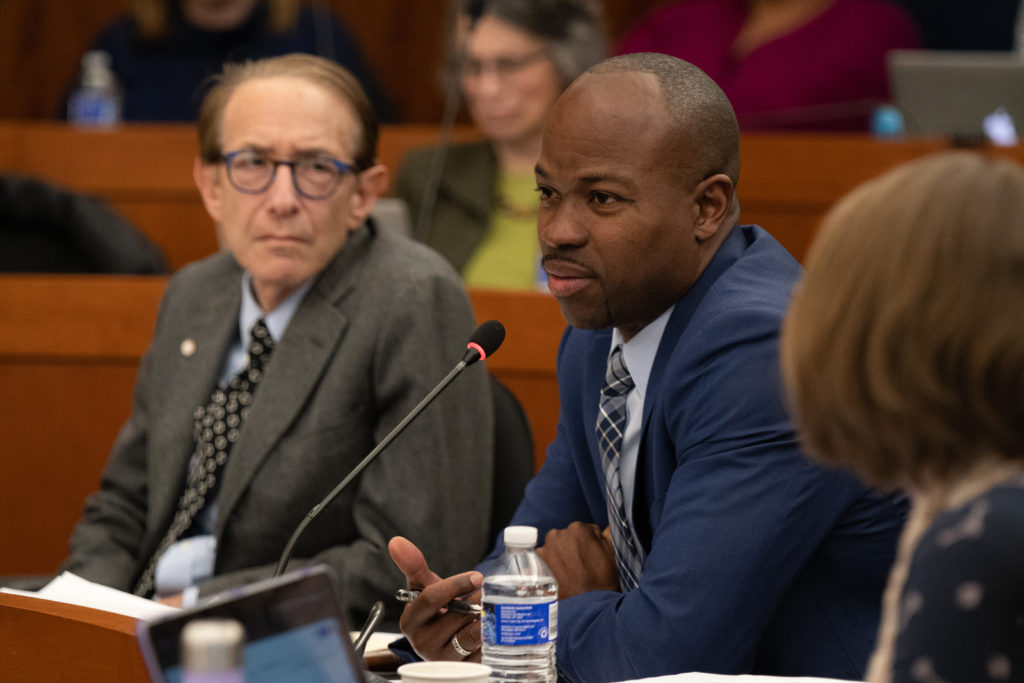Officials said they want to allow students with outstanding balances in their accounts to be able to register for classes at their regularly scheduled time for the upcoming semester.
Provost Brian Blake outlined several steps, including the revised policy on financial holds, that administrators are taking to support students and faculty through the pandemic at the Faculty Senate meeting Friday. He said he does not want financial concerns surrounding registration to be an additional worry for students as cases of COVID-19 in the District surge and the instructional continuity period continues.
“We really don’t want that also to be a variable for students that are in a different situation right now as they finish their instruction,” Blake said about the inability to register for classes.
He said officials want to guarantee refunds for enrollment deposits for all incoming international students in the event they are unable to travel to GW because of visa or “geographic” issues.
Blake added that officials are seeking to develop a “pathway” for any students who are unable to travel to campus in the fall to take classes through an online system. He said administrators and faculty have demonstrated in the past couple weeks that they are able to conduct remote instruction, and he will try to “activate” that next semester as needed.
Blake said the number of students who have committed to GW through early decision so far has fallen short of enrollment projections by a few dozen students, but he expects more commitment deposits to trickle in, possibly delayed by the coronavirus. He said officials preemptively corrected for the shortfall by admitting a “small number” of students on the waitlist early.
“On the waitlist, we have about 5,000 students,” he said. “We expect, and it’s been verified, that about a half of those students really want to be on our waitlist, so we definitely have a great deal of contingency around that.”
Blake said the number of incoming domestic students who have enrolled at GW so far is a couple percentage points ahead of model projections, while about three dozen fewer international students than projected have enrolled so far.
“Ultimately, the balance of that is still positive at this point in time,” he said. “It’s really early. Most of the action won’t happen for another three weeks so when I say we’re tracking well, that’s a minority of the deposits coming in.”
Geneva Henry, the dean of Libraries and Academic Innovation, gave a presentation about her department at the senate meeting. She said her goal for the academic year of achieving “digital and computational fluency” put the University “ahead of the game” in shifting to online classes.
Henry said she is encouraging faculty to use open access resources to reduce financial and accessibility barriers to academic materials. She added that the library’s staff is planning to launch a digital media lab but did not elaborate on when the lab would be available to the community.
Henry said staffing is the library’s “biggest challenge,” adding that officials were in the process of interviewing final candidates for 10 vacant librarian positions before a hiring freeze went into effect late last month. She said the hiring process yielded a “significantly more diverse” applicant pool than previous ones as a result of modifications to the job description, and staff is working to determine which hires can move forward to bring “desperately needed” help to library efforts.
She added that the change to the voluntary library gift’s structure from an opt-out to an opt-in system has created a “significant financial shortfall” for the libraries, as few students have opted in.
“Nobody disagreed that ending this opt-out policy for the student gifts fund was the right thing to do for the students, but it’s more of a questioning of the decision of doing that in the first place to provide us with that revenue,” Henry said.
Senators passed a resolution by a vote of 26 to six to create a “very soft law” for the senate to adjourn by 4:30 p.m. and for meeting agendas to be sent to all members at least seven days in advance of a meeting. Sylvia Marotta-Walters, the outgoing chair of the senate’s executive committee, originally brought the resolution forward at the March meeting, but the resolution was tabled at the time.
“We have had many conversations about the amount of work that shared governance takes and how difficult it is for faculty to add that into already voluminous responsibilities in the middle of this crisis,” she said.
Marotta-Walters said members of the executive committee modified the language of the original resolution, removing the original upper limit of 5 p.m. for meetings to conclude.
Guillermo Orti, a faculty senator and a professor of biology, said putting a “time constraint” on the length of meetings would be “counterproductive or even dangerous” because it will limit the senate’s ability to respond to crises like the effects of the COVID-19 outbreak. He said the next executive committee should decide whether or not to move forward with the resolution instead of the outgoing committee.
“I would advocate for letting them decide, the next senate or the next executive committee, what would be the right parameters to operate under the current circumstances,” Orti said.
The senate unanimously elected Arthur Wilson, a faculty senator and associate professor of finance, to serve as the next chair of the executive committee, succeeding Marotta-Walters, whose three-year term is ending. The senate also unanimously elected the membership of the next executive committee.











